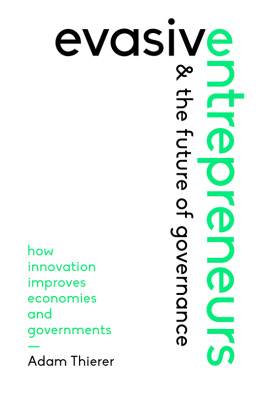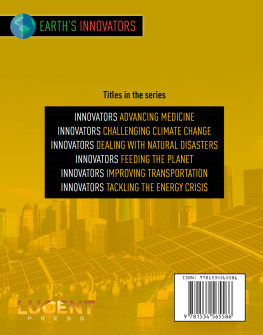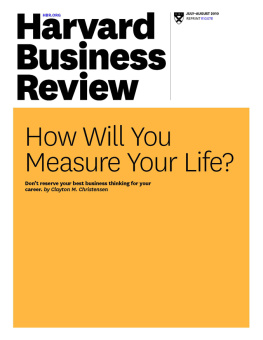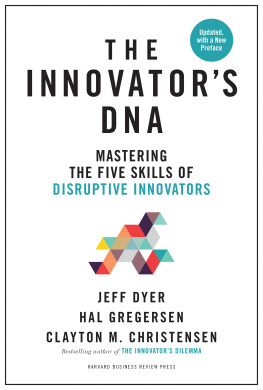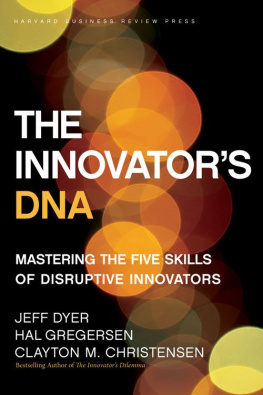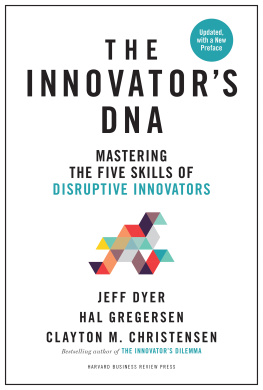I wish to thank the following individuals for the helpful feedback or research assistance they provided while I prepared this book: James Broughel, Daniel Castro, Neil Chilson, Arthur M. Diamond, Jr., Mohamad Elbarasse, Ryan Hagemann, Anne Hobson, Lynne Kiesling, Michael Kotrous, Gary Marchant, Eileen Norcross, Andrea OSullivan, Jordan Reimschisel, Will Rinehart, Marc Scribner, Jennifer Huddleston, Maurice McTigue, Trace Mitchell, Walter Valdivia, Caleb Watney, and several anonymous reviewers.
Adam Thierer is a senior research fellow at the Mercatus Center at George Mason University. He has spent more than 25 years covering the intersection of emerging technologies and public policy and has authored or edited eight books on topics ranging from media regulation and child safety issues to the role of federalism in high-technology markets. His previous book was Permissionless Innovation: The Continuing Case for Comprehensive Technological Freedom .
His writings have appeared in the Wall Street Journal , The Economist , the Washington Post , and The Atlantic , and he has testified numerous times on Capitol Hill, before regulatory agencies, and in state legislatures. Thierer has also served on several distinguished online safety task forces, including Harvard Universitys Internet Safety Technical Task Force and the Obama administrations Online Safety Technology Working Group.
Previously, Thierer was president of the Progress and Freedom Foundation, director of Telecommunications Studies at the Cato Institute, and a senior fellow at the Heritage Foundation. He received his MA in international business management and trade theory at the University of Maryland and his BA in journalism and political science from Indiana University.
ABOUT THE CATO INSTITUTE
Founded in 1977, the Cato Institute is a public policy research foundation dedicated to broadening the parameters of policy debate to allow consideration of more options that are consistent with the principles of limited government, individual liberty, and peace. To that end, the Institute strives to achieve greater involvement of the intelligent, concerned lay public in questions of policy and the proper role of government.
The Institute is named for Catos Letters , libertarian pamphlets that were widely read in the American Colonies in the early 18th century and played a major role in laying the philosophical foundation for the American Revolution.
Despite the achievement of the nations Founders, today virtually no aspect of life is free from government encroachment. A pervasive intolerance for individual rights is shown by governments arbitrary intrusions into private economic transactions and its disregard for civil liberties. And while freedom around the globe has notably increased in the past several decades, many countries have moved in the opposite direction, and most governments still do not respect or safeguard the wide range of civil and economic liberties.
To address those issues, the Cato Institute undertakes an extensive publications program on the complete spectrum of policy issues. Books, monographs, and shorter studies are commissioned to examine the federal budget, Social Security, regulation, military spending, international trade, and myriad other issues. Major policy conferences are held throughout the year, from which papers are published thrice yearly in the Cato Journal . The Institute also publishes the quarterly magazine Regulation .
In order to maintain its independence, the Cato Institute accepts no government funding. Contributions are received from foundations, corporations, and individuals, and other revenue is generated from the sale of publications. The Institute is a nonprofit, tax-exempt, educational foundation under Section 501(c)3 of the Internal Revenue Code.
CATO INSTITUTE
1000 Massachusetts Avenue NW
Washington, DC 20001
www.cato.org
Entrepreneurs who skirt regulations that would block their ideas from coming to fruition arent the greedy scofflaws theyre sometimes portrayed as. Rather, theyre engaged in a form of civil disobedience that can lead to better governance, and forward-looking public officials are taking that information to heart. In Evasive Entrepreneurs and the Future of Governance , Adam Thierer provides an important new way of reframing the debate around permissionless innovation, with lessons for business, regulators, and everyone concerned with a fair and prosperous future.
Virginia Postrel, author and columnist
Thierer presents a bold and new concept that will disrupt how society manages disruptive technologies.
Gary Marchant, professor of law at Arizona State Universitys Sandra Day OConnor College of Law
As our overly bureaucratized society threatens every day to stifle the innovation, discovery, and entrepreneurship that have for so long been regarded as a core element of American prosperity, Adam Thierer comes along with a book that shows us a better way. Blending real-life examples with the theories of social science, he shows why freedom to innovate is a moral imperative both for individuals and society at large. If humanity is to have any future at all, it must be along the lines Thierer lays down in this book.
Timothy Sandefur, vice president for litigation at the Goldwater Institute and author of The Permission Society: How the Ruling Class Turns Our Freedoms into Privilege and What We Can Do about It
In Permissionless Innovation , Adam Thierer made a clear and powerful case against regulations that bind innovators. The book was oft-quoted, but also oft-ignored by regulatorsit is hard to teach someone something that it is not in their interest to learn. But like the innovators whom he defends, Thierer courageously perseveres. In his hopeful new Evasive Entrepreneurs and the Future of Governance , Adam Thierer boldly argues that when onerous regulations persist, innovators can and should escape.
Arthur M. Diamond, Jr., professor of economics at the University of NebraskaOmaha and author of Openness to Creative Destruction: Sustaining Innovative Dynamism
Adam Thierer bravely takes up arms against a sea of anti-technology histrionics, reminding us that the benefits of permissionless innovation far outweigh the costs. Though his calls for entrepreneurs to continue evading or even ignoring counter-productive and counterintuitive laws and regulations may sound radical, its worth remembering that every great inventor in history followed that advice, to the vast benefit of society. This is a welcome counterattack to faddish technophobia. Thierers common-sense recommendations will someday be heeded by policymakers, entrepreneurs, and consumershopefully before too much damage is done to the engine of innovation driving 21st-century life.
Larry Downes, New York Times best-selling author/coauthor of Unleashing the Killer App: Digital Strategies for Market Dominance, The Laws of Disruption: Harnessing the New Forces That Govern Life and Business in the Digital Age, and Pivot to the Future: Discovering Value and Creating Growth in a Disrupted Wo
B efore I discuss the growth of evasive entrepreneurialism and technological civil disobedience and provide more substantive examples, it is important to answer a more basic question: Why should we even care about innovation and the public policies governing entrepreneurial activities? This chapter considers some of the pushback against technological innovation and makes it clear how critics fail to account for the ways in which it has powered economic growth and human flourishing in a profoundly beneficial fashion throughout history.
For some people, asking why innovation matters will seem like a silly question, or one with a self-evident answer. Unfortunately, technological innovation is increasingly under attack from many politicians, academics, and social critics. In best-selling technology policy books that are assigned in university classrooms today, a common theme is evident: technology is something to be feared, and the benefits of innovation are dubious or fictitious. Cautionary voices on the risks of rapid technological advancement are becoming louder, observes technology historian Calestous Juma in his 2016 book, Innovation and Its Enemies: Why People Resist New Technologies .
Next page
